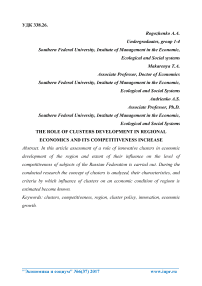The role of clusters development in regional economics and its competitiveness increase
Автор: Rogozhenko A.A., Makarenya T.A., Andrienko A.S.
Журнал: Экономика и социум @ekonomika-socium
Рубрика: Основной раздел
Статья в выпуске: 6-1 (37), 2017 года.
Бесплатный доступ
In this article assessment of a role of innovative clusters in economic development of the region and extent of their influence on the level of competitiveness of subjects of the Russian Federation is carried out. During the conducted research the concept of clusters is analyzed, their characteristics, and criteria by which influence of clusters on an economic condition of regions is estimated become known.
Clusters, competitiveness, region, cluster policy, innovation, economic growth
Короткий адрес: https://sciup.org/140124142
IDR: 140124142
Текст научной статьи The role of clusters development in regional economics and its competitiveness increase
The increase of the level of regional development and the increase of regional competiveness is an actual task for Russian economy.
Cluster method is an effective instrument in the domestic region development. Nowadays, large companies choose for their factories the areas where the clusters of supplies are forms.
Cluster is a set of enterprises and organizations situated around a scientific center and having partner sky relations with state and municipal authorities [2].
According to Michael Eugene Porter, cluster is a group of interconnected and neighboring companies (suppliers and producers, etc.) and connected with them organizations (such as educational institutions, institutes of state management and institutions of management system) working in the same field of activity and interacting with each other [3].
Michael Eugene Porter thinks that competitiveness of a country shouldn’t be considered by the common indicators of one company but by the common indicators of organizations of different fields of clusters [3].
The main characteristics of clusters let the domestic regional economy to develop while the process of clustering is a marketing mechanism of the economics systems of a region.
The main characteristics of a cluster are [1]:
-
• Presence of competitive enterprises;
-
• The leading private sector;
-
• A close geographical position of participant of a cluster;
-
• The competitiveness between the participants of a cluster;
-
• The innovation orientation;
-
• Flexibility of the structure.
It is necessary to have a competent cluster policy for an effective cluster managing. Cluster policy is based on defining of existing clusters and of clusters possible to create. It is important to see the level of development and competitiveness, to create the actions, which could improve the business-climate. The support of policy can lead to high levels of competitiveness.
Using this method, the enterprises have some advantages over other isolated companies. It gives the possibility to cooperate with a big quantity of suppliers. Working as a system, the organizations can use their resources more effectively. The level of productivity of common activity will be higher than the activity of every separate organization.
Enterprises, being a part of a cluster, learn quicker about the technical progress, the profitable cooperation with suppliers, the availability of new materials, the new concepts in marketing. There is also a possibility of observation of one company by another. The access to information is difficult for a separate enterprise. Relationship, with other members of cluster help the process of getting necessary information. All these things are advantage of clusters over other enterprises.
The influence of clusters on the economic state of regions can be evaluated with the help of the following criteria [4]:
-
1. The increase of the labour productivity takes place thanks to the increase of production.
-
2. The effect on the level of employment and productivity: increase of scales of activity in clusters leads to increase of demand on production factors and on labour force. This situation results in the increase of employment and the reduction of unemployment in the region.
-
3. The rise of salary and of living standards. The development of clusters is connected with the level of innovative and scientific activity, with forming of high-qualified labour force. The rise of qualification is followed by the rise of salary. The economic success of enterprises in clusters let increase the amount of work places. It influences well on the income of population.
-
4. The creation of new business cluster promote the development of entrepreneurship. Haring known the requirement of clusters, employers can apply their qualification and they can easily start their own business. There are also special financial enterprises to provide new organizations.
-
5. The attracting of foreign investors: the growth of production demands and additional financial resources. Clusters are attractive projects for foreign investors.
-
6. The development of research and innovative activities: the process of the creation of clusters has an innovative character. Besides, competition inside clusters helps the businesspersons to use innovation and modernization.
In conclusion, it is necessary to mention that clusters are one of the most important things to have a specific influence on the economic growth and on the level of competitiveness of the region. These components touch upon economic and social spheres.
Therefore, while promoting a high level of competitiveness, the regional government has to develop cluster policy and to provide financial support of new organizations.
Список литературы The role of clusters development in regional economics and its competitiveness increase
- Vinokurova, YU.V. Main characteristics and clusters/Yu.V types. Vinokurova//New in economy and management. -Issue 12. -M.: MAX. Press, 2012.
- Merkulov, V. V. The cluster analysis in a research of competitiveness of regions/V. V. Merkulov. -Samara: Publishing house Samara state. Economic academy, 2014.
- Malt liquor, M. Competition: the lane with English/M. Porter. -M.: Izdat. House Williams, 2012.
- Tsikhan T. V. Cluster theory of economic development//Theory and management practice. -2011.-№ 5. -page 74-81.


